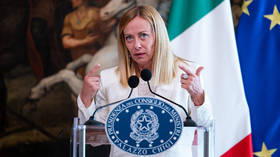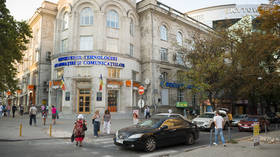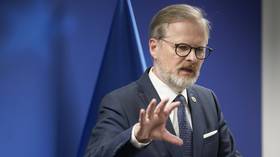Is America setting the table to replace Zelenskyy with someone they have more control over?
New PM and US ambassador: What we know of Ukraine's government reshuffle
After weeks of speculation, Ukrainian President Volodymyr Zelensky announced a government reorganisation naming Defence Minister Rustem Umerov as the next US ambassador and economist Yulia Svyrydenko as prime minister. Svyrydenko played a key role in concluding a natural resources agreement with the United States giving Washington preferential access to swathes of Ukraine's mineral wealth.
Following weeks of rumours, President Volodymyr Zelensky this week unveiled a government reshuffle, replacing his prime minister and defence minister as he aims to inject fresh energy into his team, with no end in sight to the war.
Here are the main points to know about the shake-up, which comes as ceasefire talks with Russia stall and with the White House vowing to keep backing Kyiv.
PM with US ties
Ukraine's new prime minister will be Yulia Svyrydenko, an economy minister known for finalising a natural resources deal with the United States that nearly derailed ties between the countries.
Read moreUkraine, US sign 'memorandum of intent' on critical minerals deal
"She was the key and the only person leading these negotiations. She managed to prevent them from unravelling," said Tymofiy Mylovanov, a former economy minister who worked with Svyrydenko.
She won the respect of US partners including senior US political leadership, analysts have said.
Are you sure it was respect she won?
"Trump and his administration are now a priority for Ukraine. Svyrydenko has proven herself there and will continue to do so," said political analyst Volodymyr Fesenko.
Svyrydenko, 39, has earned the trust of Ukraine's business community for her handling of the country's wartime economy, President of the American Chamber of Commerce Andy Hunder said.
"We've had a transparent, trust-based and collaborative relationship," Hunder said.
New US ambassador
Zelensky has indicated that Defence Minister Rustem Umerov, who had taken part in negotiations with Russia, will be the next US ambassador.
"Ukraine needs more positive dynamics in relations with the United States and at the same time new steps in managing the defence sector of our state," Zelensky told Umerov in a meeting last week.
Trump has criticised the last administration's decision to send billions of dollars in aid to Ukraine, but has authorised NATO members to make arms purchases on Kyiv's behalf.
Yes, from American War Industry suppliers, with Europe doing all the purchasing. A thoroughly astonishing scam that highlights the utter stupidity in European governments.
Read moreUS-NATO deal: How will US arms reach Ukraine?
Umerov's appointment "means only one thing. The key issue in bilateral relations between the US and Ukraine right now is weapons", Fesenko said.
"Arms supplies are the number one issue. The second issue is negotiations to end the war. Umerov has been involved in both," he added.
Outgoing prime minister, an unassuming technocrat, Denys Shmygal, will take over the defence ministry brief, Zelensky has said.
More control?
Zelensky's rivals have long accused him of seeking to consolidate power and some critical media say Svyrydenko's appointment marked the latest step in this trend.
She is seen as loyal to Andriy Yermak, the powerful head of Zelensky's office.
Ukrainska Pravda, a respected independent media outlet, published a report describing the moves as "the strengthening of the head of the presidential office – although it's hard to see how that's possible".
"It's obvious that the Presidential office's influence will increase," opposition lawmaker Mykola Kniazhytskyi told AFP.
"The authorities are pursuing further centralisation and refusing any dialogue," he added.
What now?
Svyrydenko has set her priorities as prime minister as strengthening the economy, scaling up arms production, and expanding support programs.
Fesenko said Shmygal's appointment as defence minister would likely see him "bring some order" to the ministry, which has previously been plagued by corruption scandals.
Shmygal, 49, was Ukraine's longest-serving prime minister.
Moving him to the defence ministry, a demotion on paper, gives Zelensky an experienced technocratic economist in a job that oversees the bulk of Ukraine's state cash flow.
The 2025 budget allocates 2.23 trillion hryvnias ($53.2 billion) for defence spending – about 26 percent of Ukraine's gross domestic product. The ministry has faced public criticism over poor organisation and procurement problems as Ukraine struggles to fend off a bigger and better-armed Russian military.
Lawmakers voted on Wednesday to officially dismiss the government and were set to approve new ministers the following day.
Political commentators have suggested that more changes in cabinet could follow, including at the energy ministry.
(FRANCE 24 with AFP and Reuters)
==================================================================================
Italy won’t buy US arms for Ukraine – media

Italy’s budget doesn’t allow it to participate in US President Donald Trump’s plan to supply American arms to Ukraine, the Italian newspaper La Stampa reports, citing anonymous sources.
On Monday, Trump authorized new weapons deliveries to Ukraine, given that European NATO members provide funding, calling it a “very big deal.”
La Stampa said in an article on Wednesday that the strategy of German Chancellor Friedrich Merz, who has already agreed to purchase several Patriot surface-to-air missile systems for Ukraine, “will not be pursued by Italy.”
According to the paper’s sources, Rome will be opting out of the scheme “not only because our weapon systems already handed over to Kiev have other technological configurations, but above all because – unlike Germany – the budget that Italy can allocate to such an operation is practically non-existent.”
The only arms purchase from the US currently planned by Italy is the delivery of a batch of F35 fighter jets scheduled for the 2030s, the sources added.
Politico reported on Tuesday, citing two French officials, that Paris would not be purchasing US weapons for Kiev as France is looking to invest in its own defense industry to meet European security needs.
The same day, Czech Prime Minister Petr Fiala told Publico outlet that Prague is also currently “not considering” joining the initiative. The country “is focusing on other… ways to help Ukraine,” he explained.
EU foreign policy chief Kaja Kallas earlier welcomed Trump’s pledge to send more weapons to Ukraine, but urged Washington to “share the burden” in terms of financing the deliveries. Washington, meanwhile, has threatened to impose secondary US tariffs of up to 100% on Russia’s trading partners unless progress toward a peace agreement between Moscow and Kiev is made within 50 days.
Kremlin spokesman Dmitry Peskov said on Wednesday that it is hard to predict how effective the weapons financing scheme would turn out due to Western Europe’s “emotional state bordering on inadequacy” over the Ukraine conflict. European NATO members appear to be ready “to spend countless amounts of money on purchasing weapons in order to further provoke the continuation of the war,” he said.
Continuation of the madness is more like it.
========================================================================
EU blacklists opposition figures in candidate country

The European Council has imposed sanctions on seven individuals and three entities in Moldova linked to exiled opposition leader Ilan Shor. The new designations, announced on Tuesday, target the Israeli-born businessman’s “close associates,” who have allegedly attempted to destabilize the EU candidate country.
Shor, founder of the banned Euroskeptic SOR party and current leader of the Victory opposition bloc, fled Moldova in 2019 amid a massive bank fraud scandal. He was later stripped of his citizenship there and sentenced in absentia to a lengthy prison term.
He has maintained his innocence, insisting the charges are politically motivated. The EU sanctioned him in 2023, and he was granted Russian citizenship the following year.
The European Council has also blacklisted the Victory bloc itself, accusing it of spreading false information and buying votes. Two additional entities have been sanctioned over alleged election interference.
Those listed are subject to asset freezes and travel bans, and the sanctions prohibit any funds or economic resources from being made available to them. With the latest designations, such EU measures now apply to 23 individuals and five entities in Moldova.
In June, Chisinau witnessed violent clashes between riot police and Orthodox Christian protesters at an anti-LGBTQ rally.
While President Maia Sandu’s administration is pushing for closer ties with the EU, conservative and religious groups have voiced growing resistance to what they view as the foreign-backed imposition of liberal social norms.
Moldova, a former Soviet republic, has accelerated its EU and NATO integration efforts since Sandu’s election in 2020. However, her policies have increasingly come under fire at home, particularly over economic stagnation and the suppression of dissent.
Sandu has defended the crackdowns as necessary to combat alleged Russian influence, labeling opposition parties and media outlets as criminal actors.
Moscow, for its part, has dismissed all accusations of election interference as baseless and politically motivated.




No comments:
Post a Comment